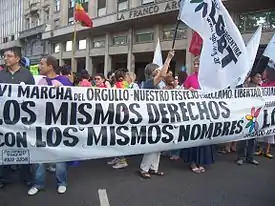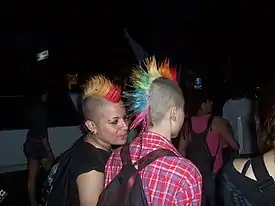March of Pride (Buenos Aires)
The March of Pride is an annual pride parade in Buenos Aires, Argentina. The march promotes the equality and rights of LGBT people.

The first March of Pride in Buenos Aires was held in the year 1992. Most subsequent marches have been held annually on the first Saturday of November.[1]
History
On June 28, 1969, a gay bar in Greenwich Village, New York called the Stonewall Inn was raided by the police. Officers made 13 arrests before being confronted by bystanders and community members; this confrontation led to the Stonewall riots.[2]
On June 28, 1970 (exactly one year later), approximately five thousand people gathered on Christopher Street outside the Stonewall Inn in commemoration of the riots and marched up Sixth Avenue to Central Park.[3] This event is widely considered the first Pride March in history.[4]
The first March of Pride in Buenos Aires occurred on June 28, 1992. Participants gathered in front of the Buenos Aires Metropolitan Cathedral and marched to the National Congress of Argentina. The march was made up of about 250 people, many of whom wore masks to avoid being recognized.[5] The group of marchers included members of the Radical Civic Union and the Mothers of the Plaza de Mayo.[6]

Marches of Pride
- In 2004, more than 7,000 people participated in the March of Pride. For the first time, a "Pride Fair" was held in the Plaza de Mayo during the event.[7]
- In 2007, approximately 25,000 people marched from the Plaza de Mayo to the National Congress. The closing ceremony was conducted by Argentine radio host and writer Daisy May Queen.[8]
- In 2008, approximately 50,000 people participated in the march. The theme was Voten nuestras leyes ("Vote for our laws"), in reference to the proposed legislation to protect same-sex marriage and gender identity which had become stagnant in the National Congress, as well as the prospect of overturning the laws which criminalized homosexuality in 10 provinces of Argentina.[9] Toward the end of the event, members of the crowd were heard booing the Vatican (which had recently spoken out against sexual diversity) and Mauricio Macri (the President of Argentina at the time).[10]
- On November 6, 2010, the March of Pride celebrated the legalization of same-sex marriage in Argentina. An estimated 100,000 people participated. Marchers and organizers also advocated for the passage of the Gender Identity Law.
- On November 5, 2011, the March of Pride once again advocated for the passage of the Gender Identity Law. The theme of the march was Ley de Identidad de Género ya ("Gender Identity Law Now"). Approximately 250,000 people participated.[11]
- On November 10, 2012, the theme of the March of Pride was Educación en la Diversidad para crecer en Igualdad ("Education in Diversity to grow in Equality").[11]
- On November 9, 2013, the theme of the March of Pride was Educación sexual, igualitaria, libre y laica ("Equal, free and secular sexual education").[12]
- On November 15, 2014, the theme of the March of Pride was Por mas igualdad real: ley anti discriminatoria y estado laico ("For more real equality: Anti-Discrimination Law and the Secular State").[13]
- On November 7, 2015, the theme of the March of Pride was Ley anti discriminatoria ya ("Anti-discrimination law now").[14]
- On November 26, 2016, organizers repeated the theme from the previous year: Ley anti discriminatoria ya ("Anti-discrimination law now").[14][15]
- On November 18, 2017, the theme of the March of Pride was Basta de femicidios a travestis, transexuales y transgeneros. Basta de violencia institucional. Orgullo para defender los derechos conquistados. ("Enough of the femicide of transvestites, transsexuals and transgenders. Enough of the institutional violence. Pride for defending our conquered rights.")[16]
- On November 17, 2018, the theme of the March of Pride was Basta de genocidio trans/travesti. No al ajuste, la violencia y la discriminación. Macri y la Iglesia son anti-derechos. ("Enough of trans/transvestite genocide. No to assimilation, violence and discrimination. Macri and the Church are anti-rights.")[17]
- On November 2, 2019, the theme of the March of Pride was Por un país sin violencia institucional ni religiosa. Basta de crímenes de odio. ("For a country without institutional or religious violence. Enough of the hate crimes.")[18]
- In 2020, in-person events for the March of Pride were canceled due to the COVID-19 pandemic.[19] Alternate events were hosted online.[20]
References
- Destape, El. "La convocatoria de la Marcha del Orgullo LGBTIQ exige la liberación de Milagro Sala". www.eldestapeweb.com (in Spanish). Retrieved November 8, 2020.
- Editors, History com. "Stonewall Riots". HISTORY. Retrieved November 8, 2020.CS1 maint: extra text: authors list (link)
- Solomon, Andrew (June 27, 2019). "The First New York Pride March Was an Act of 'Desperate Courage' (Published 2019)". The New York Times. ISSN 0362-4331. Retrieved November 8, 2020.
- Smith, Erika W. "From Stonewall To Pride 50: The History Of The Pride Parade". www.refinery29.com. Retrieved November 8, 2020.
- "Buenos Aires Times | Buenos Aires gears up for the huge celebration of LGBT culture". www.batimes.com.ar. Retrieved November 8, 2020.
- <"Micro Semanario #69 [29 de junio de 1992.]". www.fcen.uba.ar. Retrieved November 8, 2020.
- "ANRED". November 12, 2007. Archived from the original on November 12, 2007. Retrieved November 8, 2020.
- "Marcha gay en Plaza de Mayo". www.lanacion.com.ar (in Spanish). Retrieved November 8, 2020.
- Clarín.com. "La Marcha del Orgullo Gay llegó al Congreso con reclamos de nuevas leyes". www.clarin.com (in Spanish). Retrieved November 8, 2020.
- "Página/12 :: Sociedad :: Orgullo "para que voten nuestras leyes"". www.pagina12.com.ar (in Spanish). Retrieved November 8, 2020.
- "Historia de la Marcha del Orgullo en Argentina". www.cultura.gob.ar (in Spanish). Retrieved November 8, 2020.
- "XXII MARCHA DEL ORGULLO AÑO 2013". | MARCHA DEL ORGULLO | (in Spanish). October 27, 2016. Retrieved November 8, 2020.
- "XXIII MARCHA DEL ORGULLO AÑO 2014". | MARCHA DEL ORGULLO | (in Spanish). October 27, 2016. Retrieved November 8, 2020.
- "XXIV MARCHA DEL ORGULLO AÑO 2015". | MARCHA DEL ORGULLO | (in Spanish). October 27, 2016. Retrieved November 8, 2020.
- "XXV MARCHA DEL ORGULLO AÑO 2016". | MARCHA DEL ORGULLO | (in Spanish). October 27, 2016. Retrieved November 8, 2020.
- "XXVI MARCHA DEL ORGULLO 2017". | MARCHA DEL ORGULLO | (in Spanish). October 26, 2017. Retrieved November 8, 2020.
- "XXVII MARCHA DEL ORGULLO 2018". | MARCHA DEL ORGULLO | (in Spanish). November 2, 2018. Retrieved November 8, 2020.
- "XXVIII MARCHA DEL ORGULLO 2019". | MARCHA DEL ORGULLO | (in Spanish). September 26, 2019. Retrieved November 8, 2020.
- "Buenos Aires Pride (Event in Buenos Aires) on GayCities". buenosaires.gaycities.com. Retrieved November 8, 2020.
- Aires, Ente de Turismo del Gobierno de la Ciudad de Buenos (October 11, 2016). "LGBT Pride Week and parade". Official English Website for the City of Buenos Aires. Retrieved November 8, 2020.